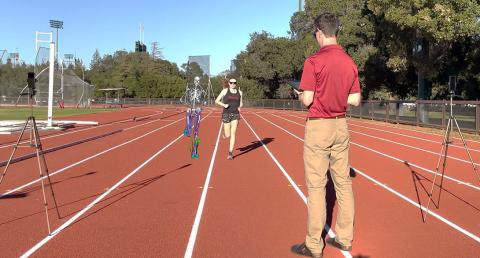New Smartphone App Quickly Analyzes Human Motion to Aid Rehab

Photo: FLORENT VIAL, STANFORD NEUROMUSCULAR BIOMECHANICS LAB
An NIH-funded research team has developed a smartphone app that can track and analyze a person’s ability to move from one place to another, known as locomotion, and other types of movements. Human motion analysis is used to evaluate patients with movement difficulties, help clinicians plan surgery and assess the results of treatments.
The research team believes using the app costs about 1% of conventional motion analysis techniques and works 25 times faster. The study appears in PLOS Computational Biology.
Researchers tested their app, called OpenCap, with 100 participants. Using two or more smartphones, the app recorded sufficient quality videos to allow for web-based, artificial intelligence analysis of muscle activations, joint loads and joint movements. Data collection took 10 hours for the 100 participants, and computation of results took 31 hours.
Traditionally, locomotion analysis requires fixed lab space and more than $150,000 worth of equipment, including eight or more specialized cameras to capture three-dimensional images. The captured data also takes several days to analyze by a trained expert.
Investigators contend the app could potentially be used to help screen for disease risk, inform rehabilitation decisions and track improvements in motion following treatment. The study was led by Dr. Scott Delp of Stanford University and funded by NICHD, NIBIB and NINDS.
